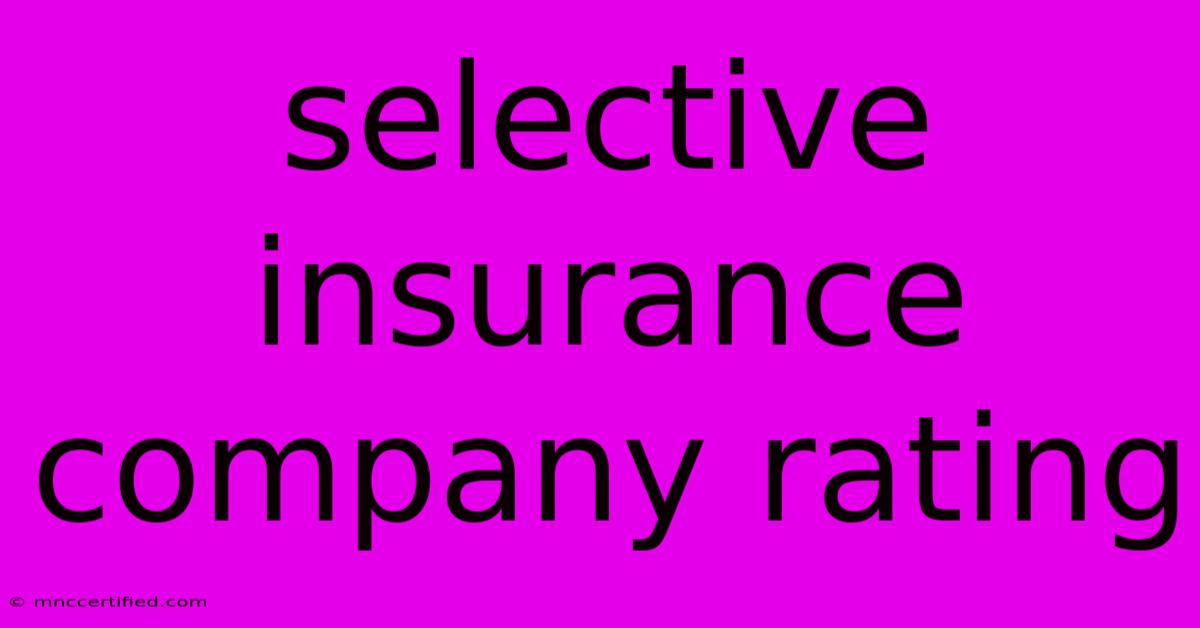Selective Insurance Company Rating

Table of Contents
Selective Insurance Company Rating: A Comprehensive Guide
Choosing the right car insurance provider is crucial, and understanding the rating of a company like Selective Insurance is key to making an informed decision. This guide will delve into Selective's ratings from various reputable sources, analyze what these ratings mean for potential customers, and help you determine if Selective is the right fit for your needs.
Understanding Insurance Company Ratings
Before diving into Selective's specific ratings, let's understand what these ratings represent. Insurance companies are rated by independent agencies based on several factors, including:
- Financial Strength: This assesses the insurer's ability to pay claims. A high rating indicates a strong financial position and a lower risk of insolvency.
- Claims Handling: This evaluates how efficiently and fairly the company processes claims. A good rating implies a smoother claims experience.
- Customer Satisfaction: Ratings here reflect customer opinions on service quality, responsiveness, and overall satisfaction.
Several organizations provide these ratings. The most prominent include:
- A.M. Best: A leading rating agency for insurance companies, known for its rigorous evaluation process.
- Moody's: A global rating agency that assesses the creditworthiness of insurers.
- Standard & Poor's (S&P): Another globally recognized rating agency that provides financial strength ratings.
- J.D. Power: Focuses on customer satisfaction and provides ratings based on customer surveys.
Selective Insurance Company Ratings: A Deep Dive
Selective Insurance is a well-established insurer, but its ratings can vary slightly depending on the rating agency and the specific line of insurance (auto, home, etc.). It's crucial to check the most recent ratings from multiple sources. (Note: Ratings are subject to change, so always verify the latest information on the rating agency websites.)
Example: Let's assume, for illustrative purposes, that A.M. Best gives Selective an "A-" rating for financial strength. This rating generally indicates a strong capacity to meet its financial obligations. However, this should be viewed in conjunction with ratings from other agencies.
Interpreting the Ratings
A higher rating generally signifies a more financially stable and reliable insurer. However, ratings are just one piece of the puzzle. Other factors to consider include:
- Pricing: Compare Selective's premiums with other insurers offering similar coverage.
- Coverage Options: Evaluate the types and levels of coverage offered to ensure they meet your needs.
- Customer Service: Read customer reviews and testimonials to get a sense of the company's customer service reputation.
Factors Affecting Selective's Ratings
Several factors can influence an insurance company's rating, including:
- Underwriting Practices: How effectively the company assesses risk and selects policies.
- Investment Portfolio: The performance of the insurer's investments impacts its financial strength.
- Claims Management: Efficient and fair claims handling contributes positively to ratings.
- Regulatory Compliance: Adherence to industry regulations and laws.
Is Selective Insurance Right for You?
Determining if Selective is the right insurer for you requires a personalized evaluation. Consider:
- Your Risk Profile: Higher-risk drivers may find Selective's rates less competitive.
- Your Budget: Compare premiums across multiple insurers to find the best value.
- Your Coverage Needs: Ensure Selective offers the specific coverage you require.
Remember to obtain quotes from multiple insurers before making a decision. Don't rely solely on ratings; consider the overall package offered by each company.
Beyond the Ratings: What Else to Consider
- Online Reviews: Explore customer reviews on sites like Yelp, Google Reviews, and the Better Business Bureau.
- Independent Agent Reviews: If you work with an insurance agent, ask for their opinion on Selective and their experience working with the company.
- Financial Stability Reports: You can find more in-depth financial analysis reports on the insurer's website and from financial news sources.
By considering these factors in addition to the ratings, you can make a well-informed decision about whether Selective Insurance is the right choice for your insurance needs. Remember to regularly review your insurance needs and compare rates to ensure you're getting the best coverage at the most competitive price.

Thank you for visiting our website wich cover about Selective Insurance Company Rating. We hope the information provided has been useful to you. Feel free to contact us if you have any questions or need further assistance. See you next time and dont miss to bookmark.
Featured Posts
-
Kay Opens Up About Crying
Nov 16, 2024
-
Is Edison Insurance A Good Company
Nov 16, 2024
-
Explained Cobra Kai Season 6 Part 2 Finale
Nov 16, 2024
-
Advantage Insurance Barberton Ohio
Nov 16, 2024
-
Le Brons Stats Wembanyamas Impact Mavs Face Challenges
Nov 16, 2024